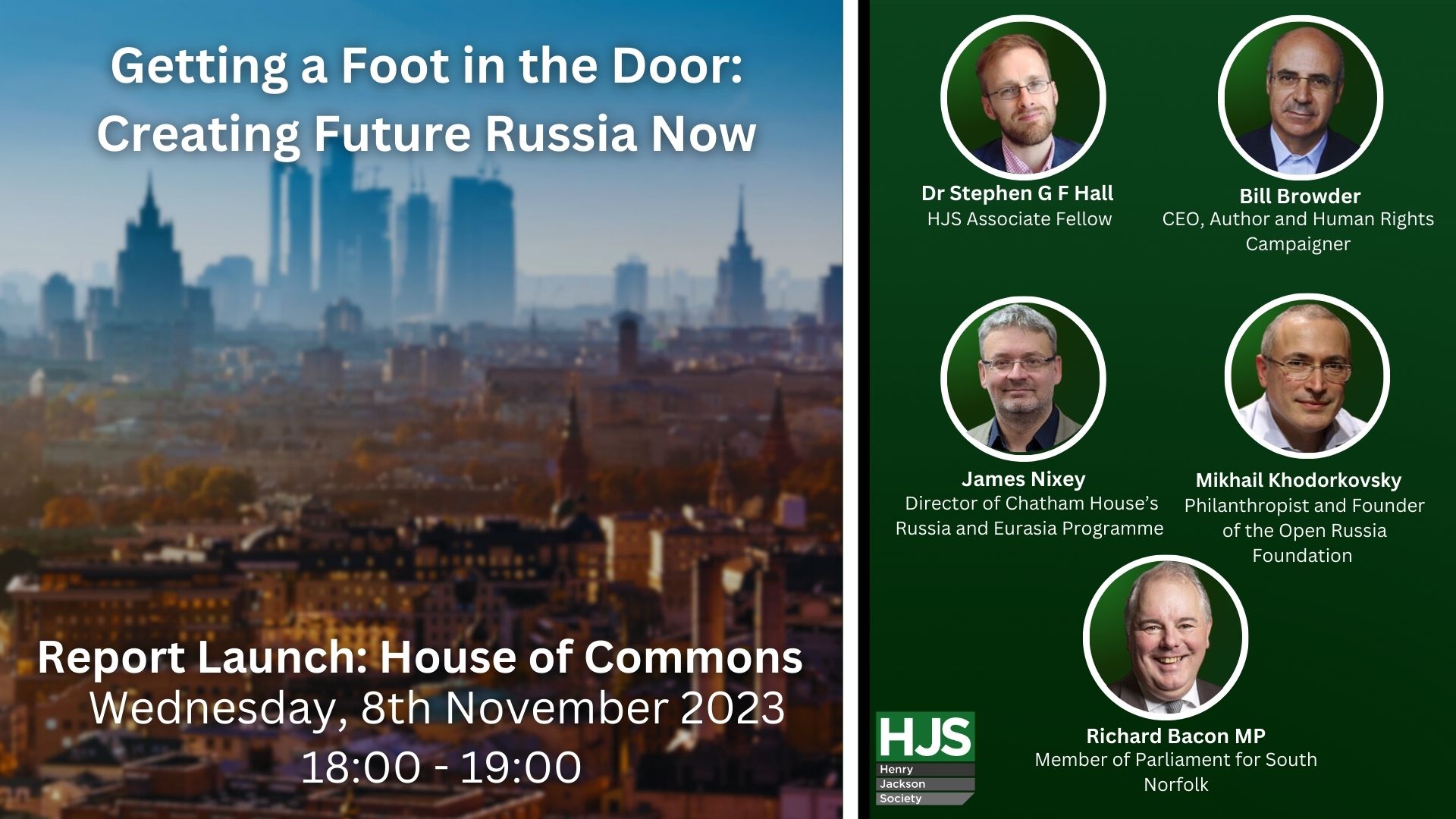Getting a Foot in the Door: Creating Future Russia Now

- This event has passed.
Getting a Foot in the Door: Creating Future Russia Now
8th November 2023 @ 6:00 pm - 7:00 pm

While the Russian war on Ukraine has yet to reach its bloody conclusion, Britain and other Western states need to plan now in the hope of shaping a less aggressive future Russia. Supporting Ukraine to win this war and re-build afterwards is a necessity. However, the West needs a Russia plan as well.
Getting a Foot in the Door, Dr Stephen Hall’s new report for the Henry Jackson Society, argues that Western governments must contribute now to preparations for a democratic future-Russia – distant as that prospect remains. While standing ready to contain the risk of continued Russian aggression, the West should also seek a route to a more peaceful future. This may involve distasteful tasks, such as engaging in backchannel talks with elements of the Russian elite to fracture Putin’s support base.
The strongest tool the West has to shape a future-Russia is the Russian diaspora. Dr Hall proposes that Western governments should make it easier for Russians to obtain visas and settle in the West. This would give the new diaspora a narrative to undermine Kremlin propaganda about Western Russophobia and possibly precipitate a Russian brain drain. A Russian university-in-exile should be created to train the next generation in business, law, politics and journalism.
While full development will be in the hands of the Russian diaspora and elites, developing a future Russia plan now will allow the West to be ready in the event of regime collapse. Britain can be at the forefront of this.
The Henry Jackson Society is pleased to gather a panel of distinguished experts to launch its latest report and discuss what future Russia could look like.

Dr Stephen G F Hall is an Associate Fellow at the Henry Jackson Society. He is a specialist on Russia, Ukraine, Moldova, Belarus, Central Asia, and the South Caucasus and on authoritarian regions. He received his PhD from the School of Slavonic and East European Studies, UCL and was a Postdoctoral Fellow at the University of Cambridge. He has published extensively in Europe-Asia Studies, Problems of Post-Communism, East European Politics, Post-Communist Economies, Russian Politics, and the Journal of Eurasian Studies.
His book entitled The Authoritarian International: Tracing how Authoritarian Regimes Learn in the Post-Soviet Space came out in 2023 with Cambridge University Press. In the past, Stephen taught at the Higher School of Economics – National Research University, St. Petersburg. Stephen speaks English and Russian and is trying to get better at Ukrainian.
Follow Stephen on Twitter @stephengfhall or on his personal website: https://www.sgfhall.co.uk/

Bill Browder was the largest foreign investor in Russia until 2005, when he was denied entry to the country and declared “a threat to national security” for exposing corruption in Russian state-owned companies. In 2008, Mr. Browder’s lawyer, Sergei Magnitsky, uncovered a massive fraud committed by Russian government officials that involved the theft of US $230 million of state taxes. Sergei testified against state officials involved in this fraud and was subsequently arrested, imprisoned without trial and systematically tortured. He spent a year in prison under horrific detention conditions, was repeatedly denied medical treatment, and died in prison on November 16, 2009, leaving behind a wife and two children. Since then, Mr. Browder has sought justice outside of Russia and started a global campaign for governments around the world to impose targeted visa bans and asset freezes on human rights abusers and highly corrupt officials.

This photo is a property of Chatham House
James Nixey joined Chatham House in 2000 and has been Director of the institute’s Russia and Eurasia Programme since 2013.He is also an Associate Fellow with the Geneva Centre for Security Policy, an honorary research fellow at the University of Exeter, and serves on the board of the journal UA: Ukraine Analytica.
Principal research interests concern Russia’s relationships with the other post-Soviet states, and key international actors.
Selected publications include chapters in Putin Again: Implications for Russia and the West (2012), The Russian Challenge (2015), The Struggle for Ukraine (October 2017), Myths and Misconceptions in the Debate on Russia (2021) and most recently, the conclusion and introduction to How to end Russia’s war on Ukraine: Safeguarding Russia’s Future and the Dangers of a False Peace (July 2023).
James has also written for The Guardian, The Times, The Telegraph, The Independent, Newsweek, USA Today, BBC.co.uk and CNN.com. He holds degrees in modern languages and international relations and has previous experience in journalism (as a reporter in Moscow in the late 1990s).

This photo is a property of https://khodorkovsky.com/
A successful businessman, Mikhail Khodorkovsky was head of YUKOS, one of the world’s largest oil producers, where he established international management codes of practice, and substantially increased production.
As a pioneering philanthropist, he established the Open Russia Foundation in 2001 with the aim of building and strengthening civil society in Russia. Having been one of the earliest supporters of democratic change, Khodorkovsky criticised endemic corruption at a televised meeting with President Putin in early 2003. Later that same year he was arrested, and jailed on charges of tax evasion and fraud, charges, which he denied and vigorously defended. Khodorkovsky was sentenced to fourteen years in prison. He was declared a prisoner of conscience by Amnesty International; and finally released in December 2013.
In 2014, the Hague Permanent Court of Arbitration ruled that the Russian Government had violated international law by taking YUKOS from its shareholders, for political purposes, described as a “full assault on Yukos and its beneficial owners in order to bankrupt Yukos and appropriate its assets while, at the same time, removing Mr. Khodorkovsky from the political arena.”
As the leader of the Russian opposition and the founder of the Open Russia movement, Khodorkovsky advocates for an alternative vision for his country: a strong and just state, based on a parliamentary republic model and committed to observing human rights, free and fair elections, and the rule of law while campaigning for building a strong civil society in Russia.
Oscar-winning documentarian Alex Gibney covered Mikhail Khodorkovsky’s life story in his latest film Citizen K which is currently featured on Amazon Prime.

This photo is a property of https://members.parliament.uk/member/1451/portrait
Richard Bacon is the MP for South Norfolk. Before his election to Parliament in 2001, he worked in investment banking, journalism and consultancy, also serving in the army’s intelligence corps (Intelligence & Security Group Volunteers – TA). Richard was educated at the King’s School, Worcester, the London School of Economics and the Goethe Institut in Berlin. He served on the Public Accounts Committee (PAC) for 16 years and was the committee’s deputy chairman from 2010 to 2017. Based on his PAC experiences, Richard wrote the book ‘Conundrum: Why Every Government Gets Things Wrong – and What We Can Do About It’ (published by Biteback Publishing) and also contributed to the book ‘How to Run a Country’ (published by the Reform think tank). He has served for 20 years as a member of the Public Accounts Commission, a statutory body which approves the strategy and the budget for the National Audit Office, becoming the Commission’s chairman in 2020.
Richard has led workshops for the National Audit Office, the World Bank and several parliaments across the Commonwealth. He has also lectured widely, including at the London School of Economics, the Moscow School of Political Studies, the Saїd Business School in the University of Oxford and at the Joint Services Command and Staff College (Defence Academy of the United Kingdom, Shrivenham, Wiltshire).
For many years Richard chaired the Iran All Party Parliamentary Group (APPG) and he is a Vice-Chair of the APPG on Russia. He founded the APPG on Self-Build, Custom and Community Housebuilding and Place-Making, and steered through Parliament a Private Member’s Bill which became the Self-Build and Custom Housebuilding Act 2015. He is now ambassador for the Right to Build Task Force, focusing on implementing the Right to Build legislation. In 2021 he led an independent review for the Prime Minister on scaling up the supply of self-commissioned homes across all tenures to boost capacity and overall supply (the Bacon Review).
Parliamentary colleagues have voted him the House Magazine’s ‘Backbencher of the Year’ (2006) and ‘Commons Select Committee Member of the Year’ (2012) and he has twice been named The Spectator magazine’s Parliamentarian of the Year (2006 and 2013).
***
SUMMARY
The Henry Jackson Society was pleased to welcome Dr. Stephen Hall, Bill Browder, and Mikhail Borisovych Khodorkovsky for a talk on their thoughts on how to undermine the Putin regime in Russia. Dr. Hall mentioned that a plethora of different actors can help Russia to become more democratic such as the UK government supporting the Russian diaspora in the UK and helping more Russian students come to study in British universities to develop their talents and skills which they can bring back to help rebuild Russia once the Putin regime falls but not so much so that Russia entirely falls apart. He also talked about how the British government should talk to the Russian oligarchy who are in Putin’s inner circle to induce a regime split and supporting defector-run Russian news outlets on a whitelist. Browder disagreed with the report stating it was very pie-in-the-sky and that the war in Ukraine is not going to end for a while but recognised that this is a war of survival for Putin but also that the US has given enough money to Ukraine to survive but not so much that it triggers Putin. He went on to say what is needed is a total humiliation and defeat of Russia, not a ceasefire and to do that the best solution is for the West to support political prisoners in Russia as well as the Russian opposition. Khodorkovsky highlighted how supporting talented, more democratic-minded Russians abroad is a much better blow to the Putin regime than economic sanctions and that they are trying to establish good connections with Europe. He went on to agree with Dr. Hall in acknowledging the benefits of supporting the Russian diaspora in that they bring western ideals back to Russia. All the speakers seemed to agree that something needed to be done regarding how the West can support Russians who want to see the Putin regime fall and that supporting the opposition (students, diaspora etc.), and influencing his inner circle can be of great benefit to creating a pathway to democracy in Russia.
RELATED EVENTS
British General Election Campaigns 1830-2019: Can The Past Inform The Future?”
The British general election is the linchpin of our liberal democracy, and its results are often fundamental to how we live. With the next UK general election looming, there is therefore … Continued



